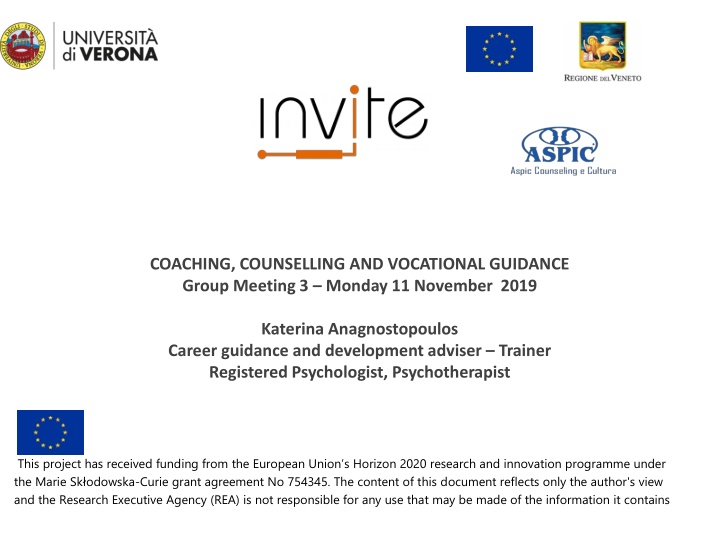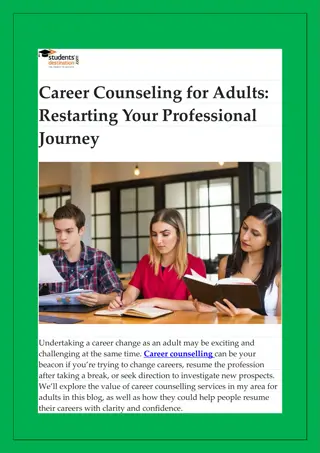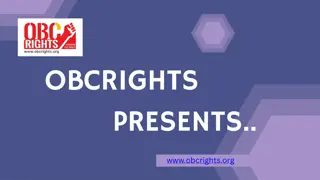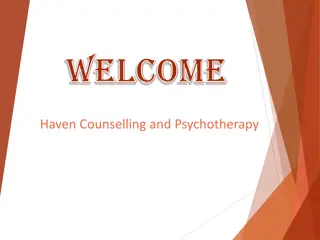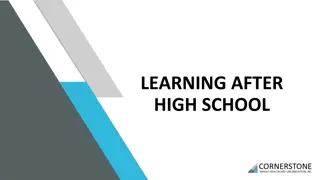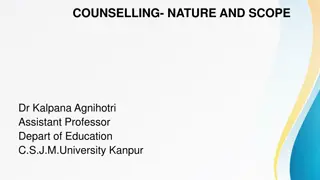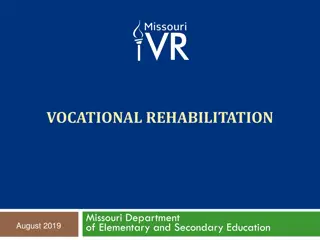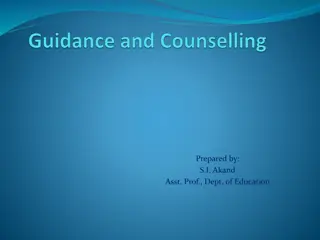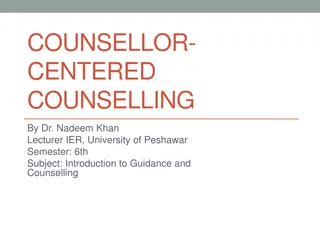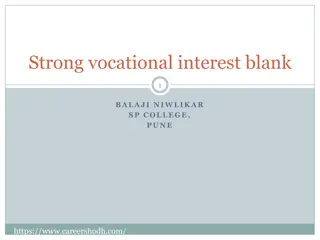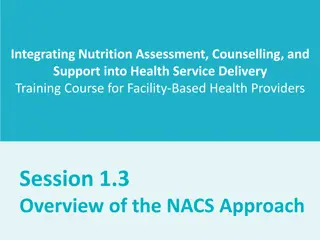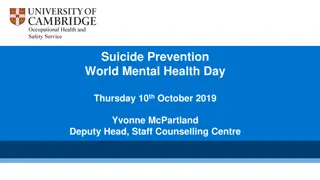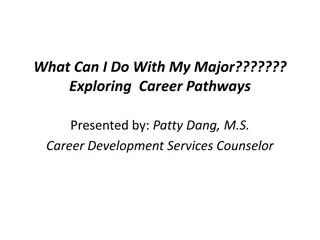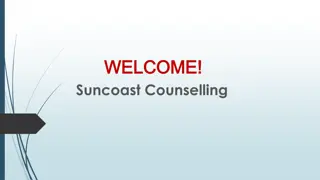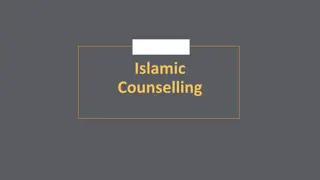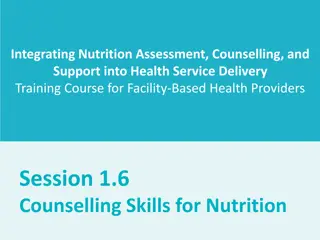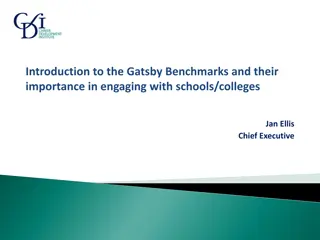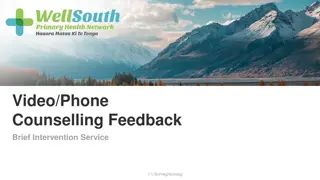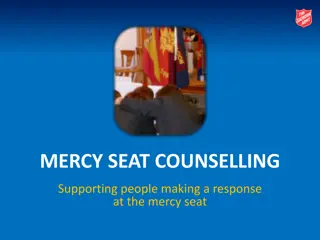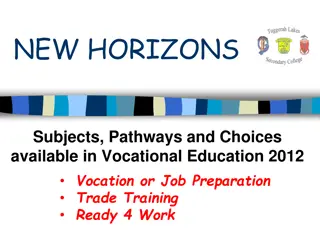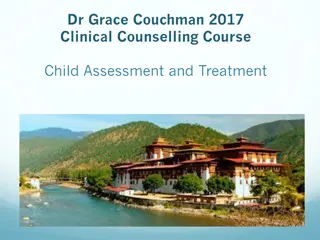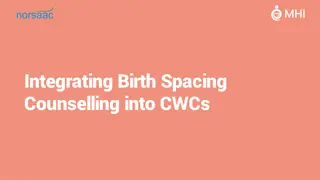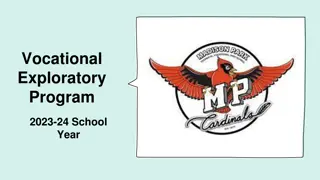Career Development Group Meeting for Vocational Guidance and Counselling
Join Katerina Anagnostopoulos, a registered psychologist and career guidance adviser, at the upcoming group meeting on Monday, 11 November 2019, focusing on career planning, skills identification, and job market optimization. Discover different stages of development and change processes, as well as strategies for building a successful career path. Explore sessions on finding career paths, handling job opportunities, and mapping sectors. Don't miss out on learning how to optimize time and resources for active job searching. Take the opportunity to reflect on past career narratives and shape your future through personalized vocational guidance and counselling.
Download Presentation

Please find below an Image/Link to download the presentation.
The content on the website is provided AS IS for your information and personal use only. It may not be sold, licensed, or shared on other websites without obtaining consent from the author.If you encounter any issues during the download, it is possible that the publisher has removed the file from their server.
You are allowed to download the files provided on this website for personal or commercial use, subject to the condition that they are used lawfully. All files are the property of their respective owners.
The content on the website is provided AS IS for your information and personal use only. It may not be sold, licensed, or shared on other websites without obtaining consent from the author.
E N D
Presentation Transcript
COACHING, COUNSELLING AND VOCATIONAL GUIDANCE Group Meeting 3 Monday 11 November 2019 Katerina Anagnostopoulos Career guidance and development adviser Trainer Registered Psychologist, Psychotherapist This project has received funding from the European Union s Horizon 2020 research and innovation programme under the Marie Sk odowska-Curie grant agreement No 754345. The content of this document reflects only the author's view and the Research Executive Agency (REA) is not responsible for any use that may be made of the information it contains
The state of play Attuning to the present moment Development in your doctoral studies agenda What has happened since the last time we met?
Proposed dates for the next meeting Morning career guidance sessions (3) Group Meeting 4 in the afternoon Monday, 27 January 2020 Monday, 10 February 2020
Session A Career Planning How to find and handle information about career paths and job opportunities Mapping sectors, job positions, research the job market optimizing existing resources and tools Reflecting on two short career narratives
Different stages of development And change process Precontemplation Contemplation Preparation for action Action Maintenance Completion Starting a new cycle A recursive process
Career building and planning Identify skills correspondence with specific jobs, or skills gaps. These may be technical or transversal. Treasure your works (experience, knowledge, skills, publications). Create the preconditions for Happenstance to unfold. This is what planned happenstance means.
Career building and planning Optimize time and existing resources Active jobs mapping and search tools
Preferences and priorities expressed in Jul19 and Sep19 Meetings Individual career guidance sessions for c.v. review and career planning Postdoc options and opportunities CV writing and customizing/adapting Linkedin, Researchgate, Video, Portfolio Practice presentation skills Self-presentation, defining a versatile professional identity Networking and treasuring contacts (e.g. secondment, attending conferences) Skills audit
C.V. and research/professional profiles in online platforms, directories, etc. Can be at the same time: Corresponding to truth tailored to the profile and professional identity you want to convey while matching the requirements of the positions you are interested in.
C.V. and profile on online platforms, directories Lay down the preconditions for a succesfull matching Explore the job offers and job market opportunities (both academia and non-academia) Specific websites for post-doc research or other positions
Self-awareness Have a clear idea of your criteria Research field Geographical Objective Kind of work
Career building and planning "Human beings were never intended to be job seekers, but to use their creativity to find solutions to problems" Muhammad Yunus Go beyond the job seeking attitude and make change come true Self-entrepreneurship for research careers Source: http://www.thehindu.com/todays-paper/tp-national/tp-karnataka/Human- beings-were-not-meant-to-be-job-seekers-Muhammad-Yunus/article17207016.ece#
C.V. and profile on online platforms, directories Online job matching platforms based on algorithms The word Algorismus which derives from the Latinization of Al-Khwarizmi's name, turned into the name of method used for computations, and survives in the modern term "algorithm" Mu ammad ibn M s al-Khw rizm Persian mathematician, astronomer Are you willing to let only algorithms rule your career building process? So, what are you to do? You can do a lot.
ResearchGate Advertisement in Researchgate Are you hiring researchers and scientists? Post a job on ResearchGate to find the best candidates from our network of 15milion researchers
ResearchGate Summary of Researchgate recruitment service Search member by. Keyword Publication history Institution Algorithms display jobs to relevant researchers We'll display your job to the right experts by matching your job to their profiles publication histories skills and expertise. When you search our members by area of expertise, institution, location, and more, we use their profiles and unique publishing histories to match the right researchers to your specific requirements. Source: ResearchGate
Topics and activities Writing, reviewing and tailoring the C.V.; Presentation, self-promotion and visibility strategies. Personal and professional identity (personal branding). Building and maintaining a durable professional integrity and reputation: values, interfacing with social media. Exploring and mapping sectors and organisations of interest; evaluating opportunities. Methods and search strategies; active job search tools; identifying, Handling change; effectively adapting to different work environments [secondment]. Self care, stress management and work-life balance. Motivation, self-efficacy, will and self-determination.
Career goals and trajectories Academic vs. Non-academic Research vs. non-research career University vs. Non-university research performing organisation Industry or other for-profit sector Public or private non-profit research organisation Other public/private Cultural entities institutions,
Career goals Pave the way for the transition to a Postdoc career C.V., visibility online, research profile definition, networking, publishing Relationship building and networking are ongoing processes
From life and career roles to possible future selves Career encompass the total constellation of life roles that we play. In order to manage your career effectively it is useful to integrate the roles of life Careers as manifestations of our attempts at making sense out of our life experiences Internal cognitive processes + External factors, society, culture, relationships that shape a person s career development
Links to relevant web sites References/Links https://www.researchgate.net/publication/3225085 04_Visualizing_detailed_postdoctoral_employment_ trends_using_a_new_career_outcome_taxonomy
Online tools and resources Science and Technology Jobs https://www.elsevier.com/connect/how-to-find-your-dream- research-job-without-swimming-through-a-sea-of-listings Science and Technology Jobs https://www.mendeley.com/careers/
Science and Technology Jobs https://www.mendeley.com/careers/
Practice WILL Mapping and analysing recruitment web sites Lifescience Recruitment https://lifescience.ie/ https://jobs.sciencecareers.org/
Tailoring strategies that work for you Online resources Explore information and filter Practice and exercise Ask a peer to peer feedback from trusted colleagues
Planned happenstance - I Constructing unexpected career opportunities Identifying,/creating/benefitting of chances and opportunities Acknowledging chance in your career and work practices Reviewing your role(s) and self-identities Uncertainty bears also merits and potentialities Accept and appreciate not knowing (R. Feynman, Nobel Prize in Physics, 1965) Adapted from: Mitchell, Levine, Krumboltz; 1999; Gysbers, Heppner, Johnston, 2003.
Oral presentation skills Session B: 16.00 17.30 Public speaking implies self exposure To practice oral presentation skills helps enhancing mastery in handling interviewing processes, facing exams, coordinating meetings, etc.
Giving effective oral presentations Michael Faraday s lectures and conferences
Transversal and transferable skills Communication skills Communication/Presentation Communication/Dialogue with non technical audiences* Teaching skills Use of science* in policy making (OECD)
Oral presentation skills Experiential exercise and practice serve the purpose of Building self-confidence Desensitize from performance anxiety Having feedback from oneself and others Enhancing awareness Optimizing modes of presenting facts, ideas, yourself Identify elements to address and ameliorate
Develop listening skills Plutarch attributed qual weight to the practice of speaking abilities and to the acquisition of the habit of listening listen cheerfully and affably as though he were a guest at some dinner or ceremonial banquet, commending the speaker's ability in those parts wherein he achieves a success, and favourably accepting the goodwill, if nothing else, of the speaker who propounds his opinions and tries to persuade others by the reasons which have persuaded himself , "On Listening to the Lectures of Philosophers, Plutarch
Giving and receiving feedback Listening attentively and actively Offering feedback without judging Multiple perspective taking Taking the perspective of the speaker/the audience Self-feedback Strenghts and aspects to enhance
Arrivederci! Thank you for your commitment and participation Next meeting in Year 2020 Training material created by Ekaterini Anagnostopoulos, protected under Creative Commons Attribution Non Commercial Share Alike 4.0 International license. Adapted and used in the INVITE Project Coaching, Counselling and Vocational Guidance activities This project has received funding from the European Union s Horizon 2020 research and innovation programme under the Marie Sk odowska-Curie grant agreement No 754345. The content of this document reflects only the author's view and the Research Executive Agency (REA) is not responsible for any use that may be made of the information it contains
